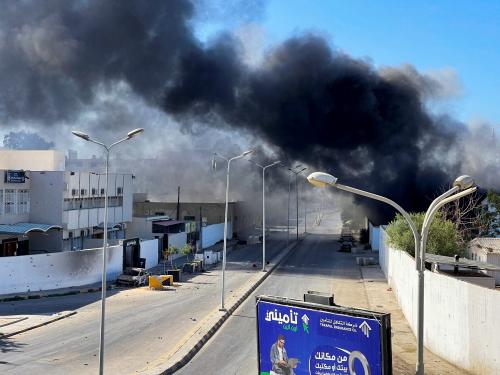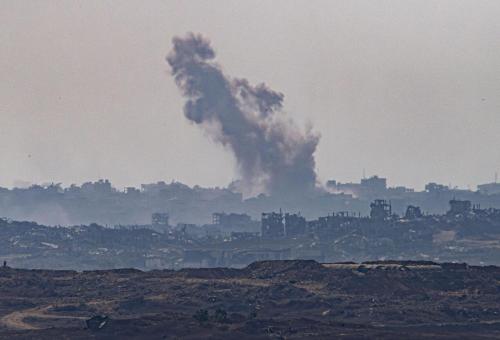The unprecedented and sustained Israeli protests against the government of Prime Minister Benjamin Netanyahu’s proposed judicial overhaul that threatened to substantially weaken the judiciary have captured news headlines worldwide. They have also coincided with a spike in violence in the occupied Palestinian territories. Although the protests have largely ignored Israel’s military rule over millions of Palestinians, they drew attention to threats to democracy even within Israel’s pre-1967 borders. It is hard to know if these protests have had any impact on the way Americans perceive Israel, and if they did, in what direction. While these protests may have drawn attention to the right-wing government’s autocratic ambitions, they may have also highlighted the existence of a free environment, at least for hundreds of thousands of Israeli citizens, to protest freely and reject the government’s plans. Do Americans see Israel as a vibrant democracy or as something far less?
To find out, we fielded a few questions in our University of Maryland Critical Issues Poll with Ipsos, which I direct with my colleague Stella Rouse. The poll was conducted March 27-April 5, 2023, among 1,203 respondents by Ipsos probabilistic KnowledgePanel (margin of error 3.2%).
We asked: “You may have been following recent developments in Israel, the West Bank, and Gaza. In your opinion which of the following is closer to describing the way Israel looks to you.” We provided the following four options: a vibrant democracy; a flawed democracy; a state with restricted minority rights; a state with segregation similar to apartheid. The results were surprising on many levels.

First, the number of respondents who said they didn’t know was very high for this kind of question: more than half of respondents overall and nearly two-thirds of Republicans. This number of people saying they didn’t know is usually reserved for questions about which one would expect a lack of familiarity (questions about the Boycott, Divest, and Sanctions movement (BDS), for example). Typically, on matters of opinion, respondents often answer even when they don’t fully know the issue. All this suggests that there is a level of discomfort among respondents in answering this question. This is also born out in the fact that the percentage of those who said they didn’t know was very high even among those with a college education and above; among Republicans, most of those with college degrees and higher said: “I don’t know.”
![Q. You may have been following recent developments in Israel, the West Bank, and Gaza. In your opinion which of the following is closer to describing the way Israel looks to you: [Excluding those who said "I don't know"]](https://i0.wp.com/www.brookings.edu/wp-content/uploads/2023/04/fig2-3.png?fit=400%2C9999px&quality=1#038;ssl=1)
Second, in this case, one may expect far more public exposure to the issue. Israel has been an important topic in the American discourse for decades, especially among Republicans in recent years. It is typical to hear Israel referred to as the “only democracy in the Middle East” or with reference to its “shared values” with the United States. Yet, even among all those who responded, the highest percentage, 31%, was equally shared by those who described Israel as “a flawed democracy” and those who described it as “a state with segregation similar to apartheid.” Among Republicans, a 41% plurality said it is “a vibrant democracy” while 20% said it is “a state with segregation similar to apartheid.”
Among Democrats, the story was strikingly different: A plurality of those expressing an opinion, 44%, said it is “a state with segregation similar to apartheid,” followed by 34% who said it’s a “flawed democracy.” This is remarkable because the use of the term “apartheid,” in the American mainstream discourse, while increasingly heard, is still highly uncommon and even taboo in many circles.
Do these results reflect the impact of recent events in Israel/Palestine and the rise of the far-right government in Israel? It is difficult to tell, as this is the first time that we have asked this question in our polling.
It is notable, however, that in one of our tracking questions about U.S. policy toward Israel/Palestine, we found little change in attitudes from our October poll. In probing whether respondents want the United States to lean toward Israel, toward the Palestinians, or toward neither side, we found only a small decrease in the number who want the United States to lean toward Israel, mostly within the margin of error.

Finally, we asked respondents about their view of the BDS movement. In this case, we added the choice “unfamiliar” in addition to the choice “don’t know” to try to further understand the meaning of the responses. Not surprisingly, a large number, 39%, said they were unfamiliar, while 26% said they “don’t know” — which is still a high percentage, possibly indicating they had some discomfort expressing an opinion on this issue as well.

When examining the results among those who offered an opinion, there was an unsurprisingly large difference between Democrats and Republicans. Among Republicans, 65% said they opposed BDS. Among Democrats, the picture was different: a plurality of those who expressed an opinion, 41%, said they supported it, while only 20% said they opposed it.
![Q. What is your position, if you have one, on the Boycott, Divestment, and Sanctions (BDS) movement aimed at Israel? [Excluding those who said "I am unfamiliar" or "I don't know"]](https://i0.wp.com/www.brookings.edu/wp-content/uploads/2023/04/fig5-2.png?fit=400%2C9999px&quality=1#038;ssl=1)
It is clear that public attitudes about Israel are shifting. The term “apartheid” appears to have become a common term among many Americans, especially Democrats, and even the BDS movement, which has faced considerable obstacles in the American mainstream, seems to have sizable support among Democrats who expressed their opinion. A recent Gallup poll found that, for the first time in their years of polling on Israeli-Palestinian issues, more Democrats sympathize with the Palestinians than with Israelis by a margin of 11 percentage points. And while about half of Republicans continue to say they want the United States to lean toward Israel, that support is diminishing among young Republicans — 32% in the current poll — and, as other research has shown, support for Israel is declining even among young evangelical Christians.
The Brookings Institution is committed to quality, independence, and impact.
We are supported by a diverse array of funders. In line with our values and policies, each Brookings publication represents the sole views of its author(s).










Commentary
Is Israel a democracy? Here’s what Americans think
April 25, 2023